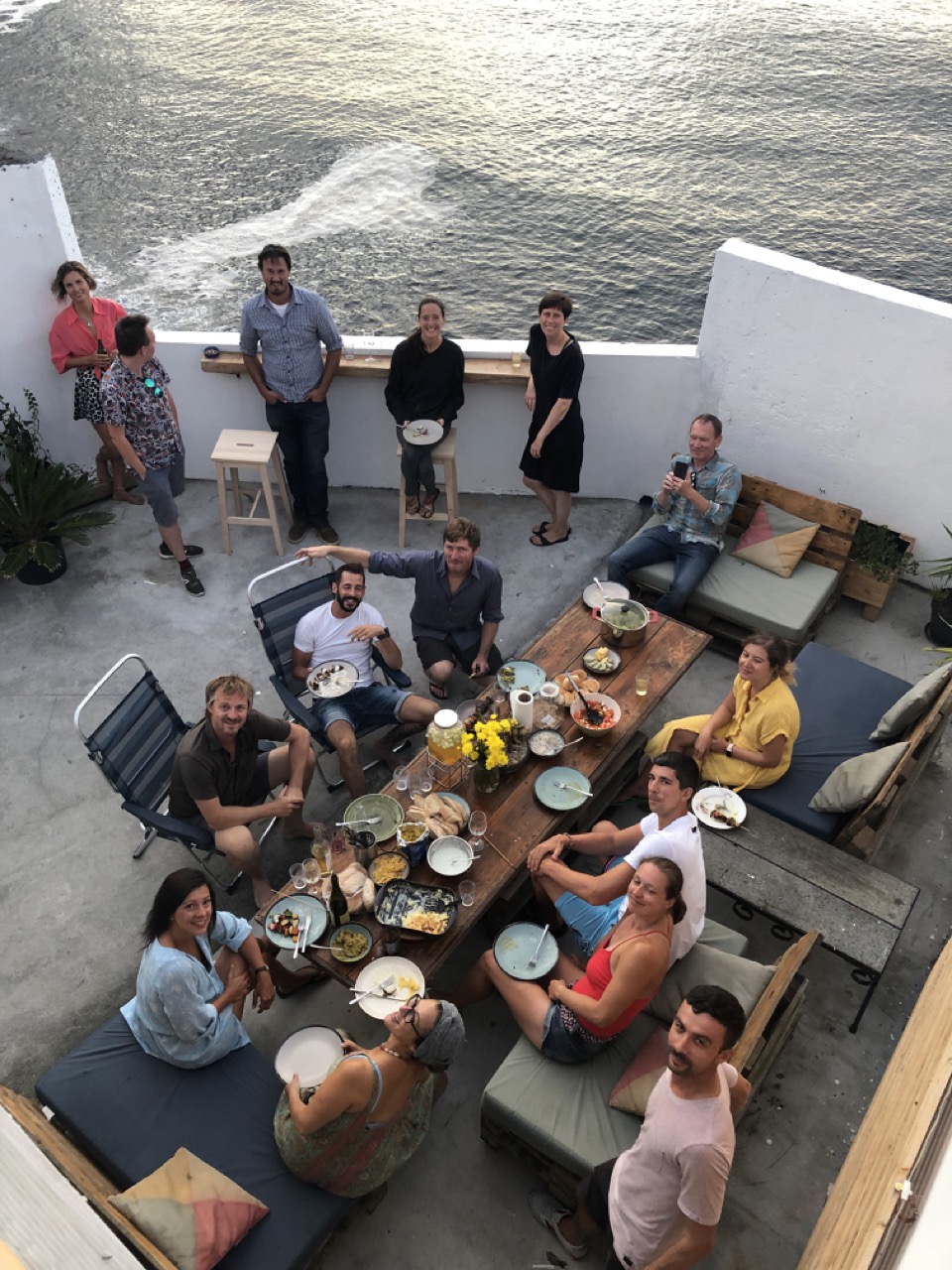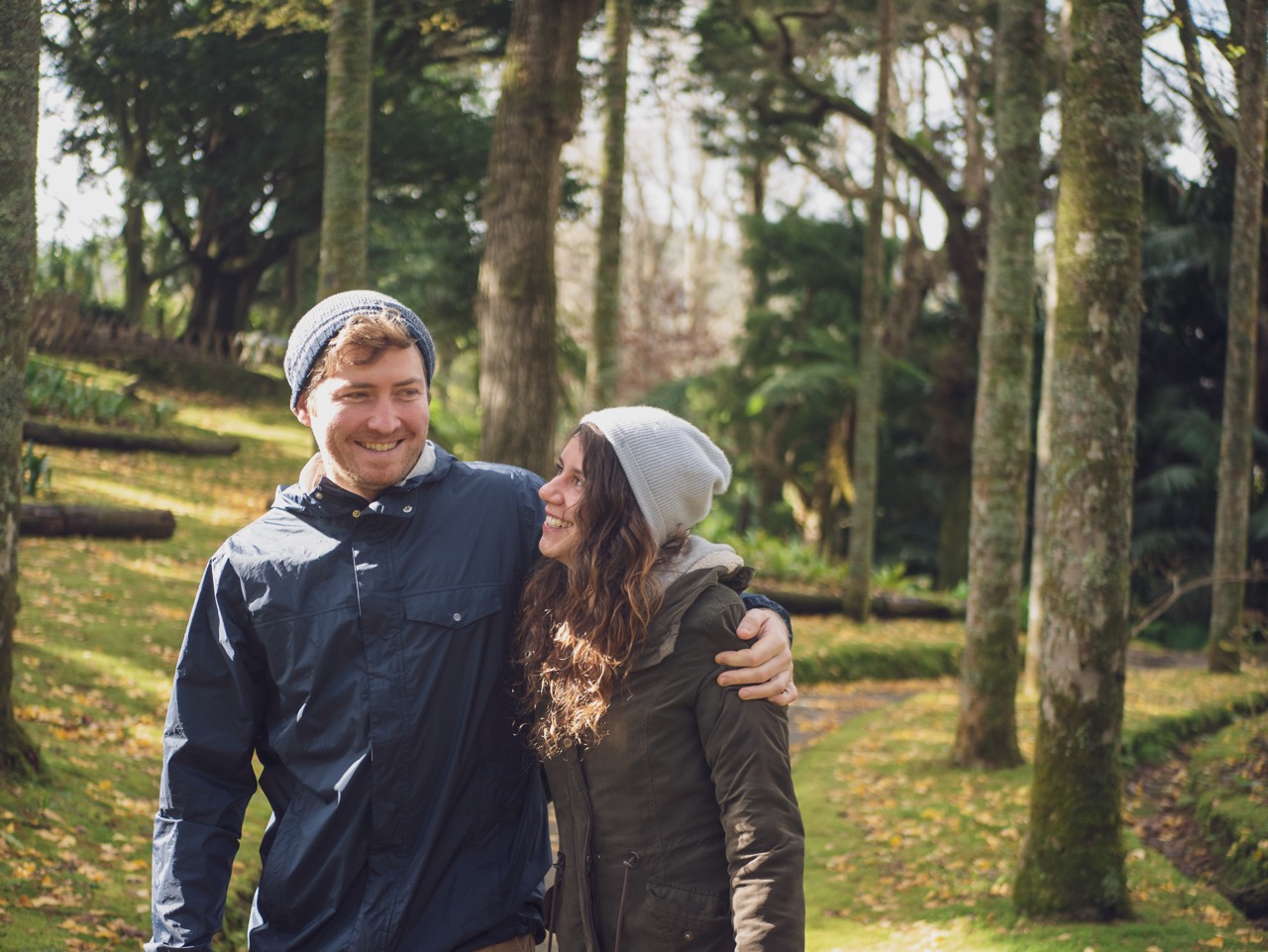Interviewer: Please introduce yourselves?
Ania: My name is Ania, I’m from Poland and we’ve been in the Azores for 3 years. 3 and a half! We arrived in June 2019.
Charles: My name is Charles Driscoll, I’m from Michigan and we arrived here in June 2019 with one-way tickets to find a project in the Azores.
Interviewer: Tell me why you thought this was the place for you to settle?
Ania: We came here twice just for vacation. We just got really inspired and we loved it here. We knew we would be back and then we started to think about coming here more permanently. We had travelled and lived around the world and were choosing our next destination and we thought why not the Azores? We should maybe go and start something together there.
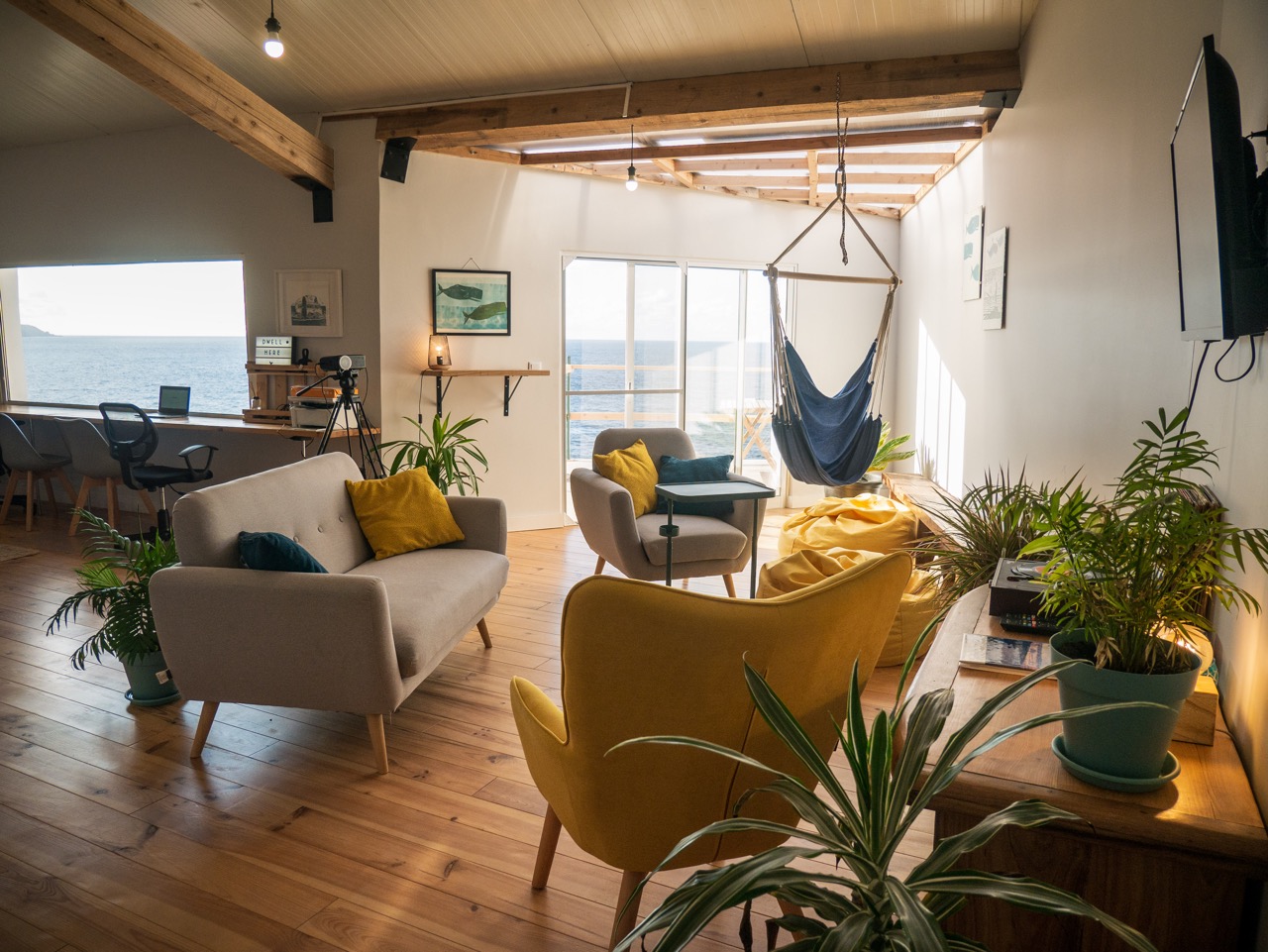
Charles: The island really struck me as a unique place. It is an island and had an island vibe to it but at same time isn’t the typically over-developed tourist destination which you sometimes find on islands, the beaches lined with hotels and resorts and a main street with only shops and restaurants designed for visitors. Here in the Azores, you can see that most things that exist here are made for the people who live here not for the people who visit. There are things to do for visitors no doubt, but most of the things that have been built have originally been built for locals. Also, it has a very agricultural feel to it. That was a big surprise to me. Almost every other island I have been to, there’s no farmers around. To be here and to see so much of the island was covered in fields and farms was a real surprise to me.
Interviewer: So, your main drive to settle here was really to be amongst nature, the sea, this agricultural world?
Charles: Yes, I liked the idea of being near the coast. I grew up next to lake Michigan and I miss it when I live in places which don’t have water nearby. It was also great to finally find a place that wasn’t overly touristic and overdeveloped. I grew up on a pig farm so coming over here so I was feeling quite a home amongst the farms.
Interviewer: Well, Charles, you don’t run a pig farm here. You run a co-working co-living. What is that and why did you think this was the business to start in the Azores?
Charles: I suppose the idea for a place which people could stay and also work was based on our own experiences of backpacking and travelling around the world ourselves. Sometimes this has been for leisure but there have also been times when we had to maintain a professional life with work on a daily basis. We were each doing some remote work and we realised throughout our travelling how difficult it was to maintain a proper work environment whilst travelling. Also, we missed some of the elements of our younger years of hostel life and that great social component you get. Once people get older, they tend to use hotels and its more difficult to really connect and meet others as compared to the hostel model. We were trying to think of a way to make people really connect on a personal and a professional level whilst also maintaining a place where people could actually work. Co-working and co-living were the perfect combo in this day and age. We purchased this ruin in October 2019 just before the pandemic and had nine months of renovations. Of course, we were really worried that Covid was going to stop all the travellers, but it was too late to stop. We had sunk all our money into the project and we couldn’t stop. It turned out in the end that the pandemic was actually a benefit to us. When the pandemic came the entire workforce was a remote worker and the target market widened dramatically. Now we are leaving the pandemic you can see the residual effects of that initial remote working wave. Employees are now demanding, and employers are providing remote working conditions. We find more and more people, people in normal corporate jobs, being able to take off at least a few weeks a year and its these people we are now seeing.
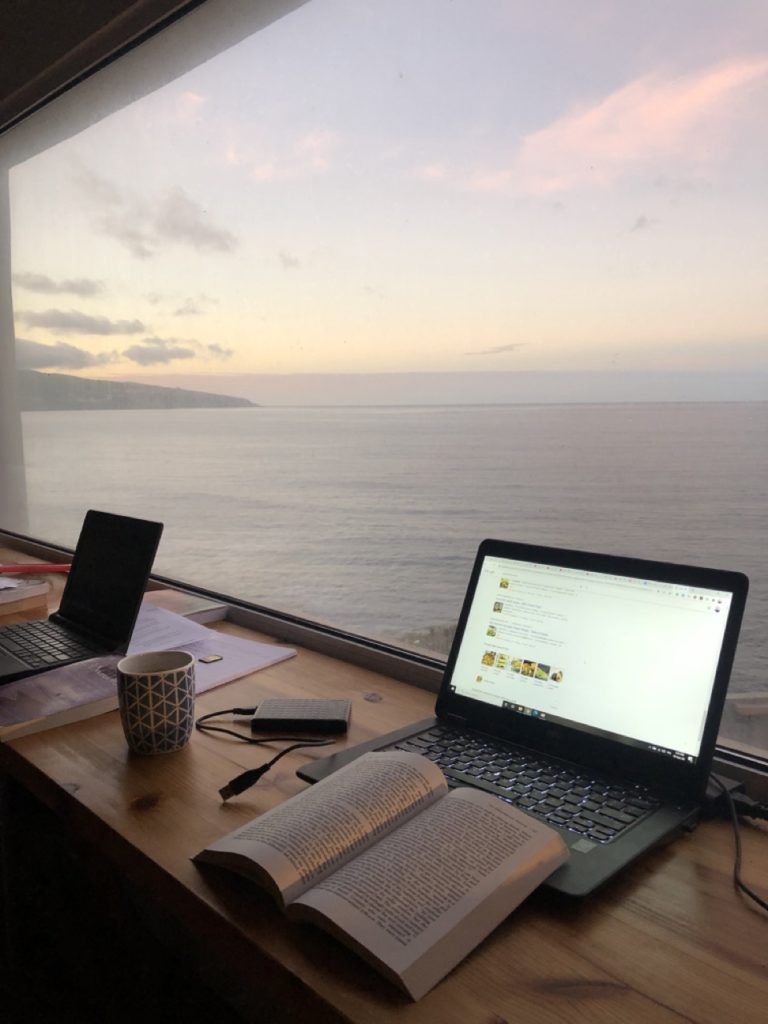
Interviewer: I know you’ve had a really successful summer. What kind of people have been passing through your doors?
Ania: At the beginning we had a mix of travellers and workers. The more time we have been open, the more workers pass through the house. We also notice that they are not only web developers but all sorts of freelancers, coaches, writers, start-ups, yoga teachers, remote teachers, photographers, videographers. Quite amazing.
Interviewer: It’s such a remote place. How do they choose the Azores? It feels like it was quite a secret place until a while ago.
Ania: I think that is what draws people here. They think that it is not that well known a place, unspoilt. They want to discover it before it changes.
Interviewer: What’s the impression they have when they arrive?
Ania: Mostly surprised that it is so green, so rural.
Charles: And surprised, at the same time, that despite its rural isolation the entire island has fibre internet. We have faster connections here than most people have in their cities in continental Europe or even the US. Those connections are slower than what we have here in our village.
Interviewer: Was this a conscious decision by the government to have such high-speed internet?
Charles: I think that was just thrown in their laps as the communications channels between US and Europe passes through the Azores. Because this is stopover it serves as a conduit. They did have to do some work to get it up from the sea floor but in general all of this high speed information connection is just passing through the Azores.
Interviewer: And are people staying now for longer?
Ania: We have heard many times of people thinking of moving to Sao Miguel or the other islands: ‘Hey guys we were wondering how you came to find this house because we’ve been thinking, we’ve been wondering, that this could be the place.’ We’ve heard that many times.
Interviewer: How many people actually make the move? Do you know?
Charles: It’s hard to measure because there are a lot of people who kind of had it rolling around in the back of their minds before they even came here. ‘We thought about moving to the Azores, so we came here to Dwell just to check.’ There are quite a few areas however that make it difficult for foreigners when they come here – finding reliable real estate agencies, difficulties with government agencies and contractors, things like this. It is very difficult for foreigners to adjust systems which do not function like the ones they have come from.
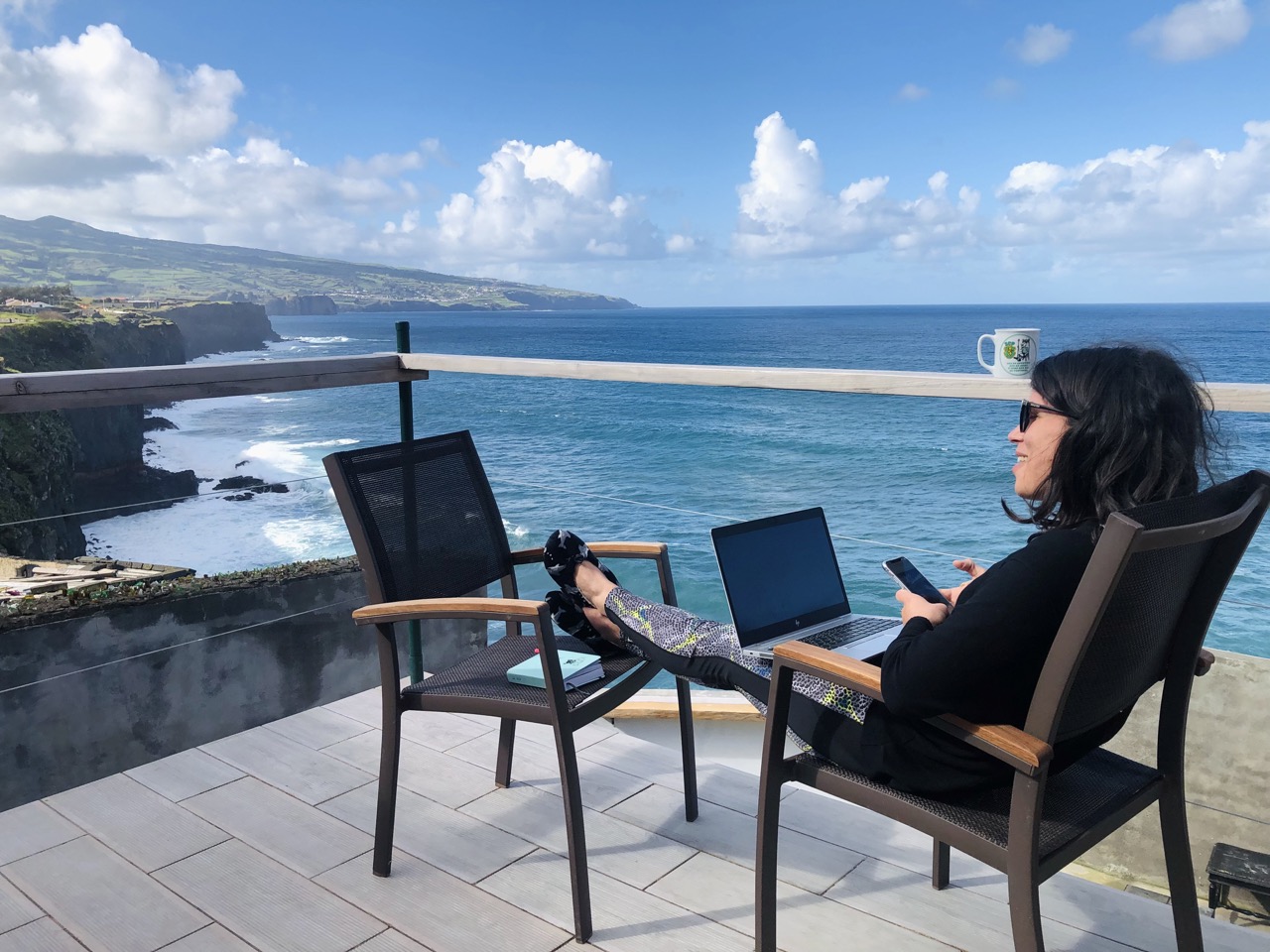
Interviewer: It’s a conservative society. People are often conservative in the way they do things, especially here in Fenais de Luz, which is a very traditional Azorean village. How has your interactions with the village been and what’s their reception of what you are doing here?
Charles: We have had a few conversations with locals about what is happening inside the house. Ania and I did a lot of the physical work and renovation on our own house so we gained respect for doing the physical labour ourselves, as this is real work. You do things with your hands and you have something to show for it, I think they see us as workers. But when they ask about who is staying and what they do it has been difficult to explain that the people who come here don’t work for us. They are not our employees. This is a bit of a stretch for people here – the idea that the work they are doing is from all over the world. As far as the influx of travelers goes, we try and integrate with our community as much as we can. There is a number of bakeries in town and a winery. Many of our guests turn up at these very local places and they are greeted with a fair amount of curiosity, because in earlier days most people left this place to Europe or the United States to find a better life. So when locals see people coming here it’s encouraging because they see that other people think that this is a nice spot. They want to be here too, so it’s a bit of a boost to their pride and morale to see it isn’t just people leaving but people coming too.
Interviewer: You could really see the Azores as symbolic as to the way the world of work is changing. It was an isolated but beautiful spot with not many job opportunities. Many people went to America. This is changing now, not only are families from the Azores coming back but there is an influx of people who just don’t want to live in cities anymore. They want to have a job of international stature and pay at the same time they want to live in a beautiful, natural place. I wonder how this will play out in the future. One issue is rising house prices. Have you thought about that or experienced any issues while you have been here?
Charles: I think we can see some negative effects certainly of the foreign influx. I would make the argument that it is not so much the digital nomad generation who are an economic threat in the island as much as the older retired age group. The biggest factor in driving up house prices is the people who left São Miguel when they were ten or twenty, made their life and their careers and pretty big money in US and Canada and now want to come back home and retire. You have many of them coming back with money which is exceptional here, pockets full of money after selling their American houses. These people are knocking down and building or buying new and this creates a massive pressure on the local market. It’s this group of local retirees, from the Azores but also from Europe, who sell their house abroad and can buy a mansion for themselves here and still have hundreds of thousands left over, these people are really making it difficult.
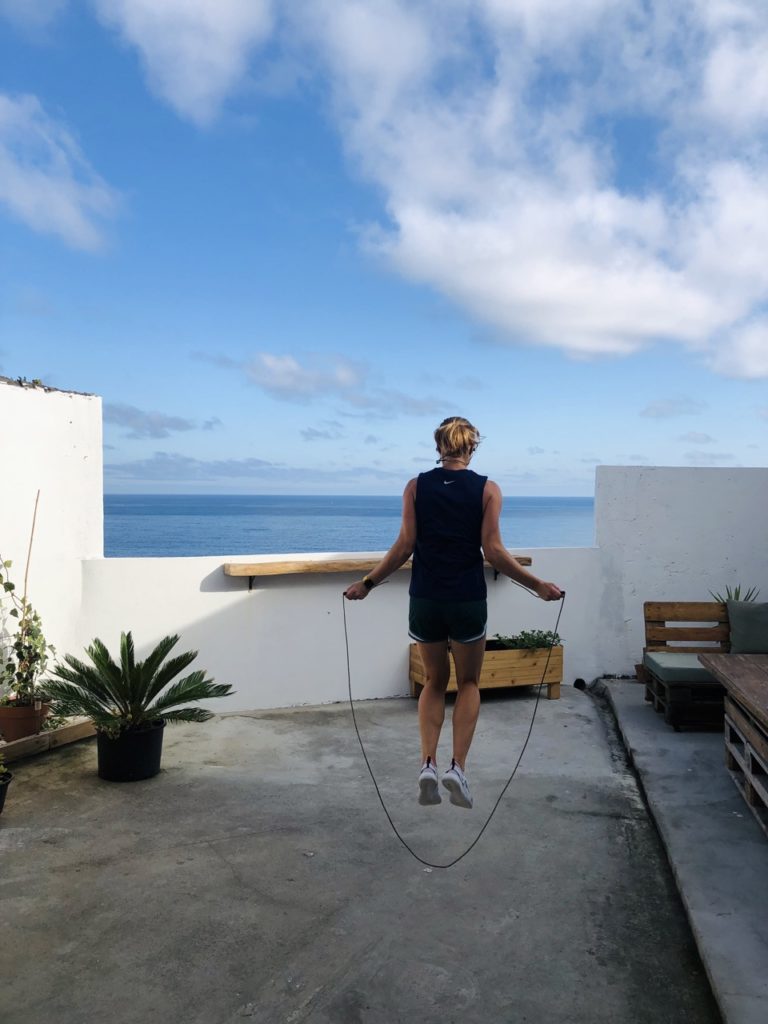
Interviewer: Anything else you’d like to add about the world of work in the Azores and the new Azores?
Charles: The Azores has a possibility of going two ways in this new world of work. It depends on how well and how nimble the government will be in adapting to these changes in the workforce. It’s not unique to the Azores that the world of work is changing. I come from Michigan which has been hit hard by the post-industrial shift. The Azoreans are no exceptions to the changes in what work means however the populace itself is not equipped with the financial or organisational resources to change the structure of employment. If the government is able to capitalise on this movement, they would be able to bring this island to an entirely new level of wealth for the people who live here. I mean Azoreans, not just the influx of those coming in. We’re seeing it a bit already – previously young Azoreans who would leave to Lisbon or Porto to study and would not come back because there were no jobs for them. At least these people with their university education are now able to take jobs at corporations which allow them to work from here. These young people often do not want to leave but have been forced to in the past because there were no graduate jobs available on the island. A game developer, for example, can come back home from university straight after their degree and work from here. Again, this is happening for people who are just going to university, but the government will need to work with retraining older people. And as farming becomes more and more industrialised here you need fewer and fewer farmhands. The government will need to continue training people for the next generation of work and encouraging people with economic incentive, showing people if they get a degree and stay here, they will get forty percent more pay then if they just stayed here to work without a degree.
Ania: I am hoping that things will change for the better because we would like to see the locals working. It is kind of sad to see young people, young men especially, just wasting their time away at the bar drinking here in town. We have had some conversations with those people. They say that they are bored and that there is nothing else for them to do. I’m not sure what the solution for those people is but I really hope that the government will get involved and start some programmes for training and opening up some new opportunities for these people so they can see that they can do things. They are able to do so many things but there is no one to show them the possibilities. We were discussing the future of our town Fenais de Luz with lots of people in a new programme, brainstorming ideas about what they can do to create opportunities and help others. The locals really wanted us to be there – digital working was one of the bullet points – they said ‘you guys you can teach us something about this world because we don’t know it but if we can attract people to come to Fenais to work remotely then that would be great, we just would like some help from the government to help create an interface for this.’
Interviewer: Fenais de Luz is interesting because it is traditionally quite a poor village but there is a lot of movement and many green sprouts coming out here. It is beautiful to see these two sides to the world, which just years before would have been oceans apart. I guess there is a risk to these meeting but also a hope that they will emesh in productive and new ways
Charles: Mutually beneficial connections between the two.
